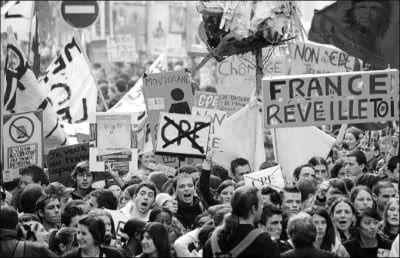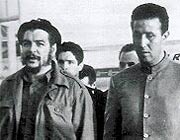FROM OUR ARCHIVES: Articles you missed the first time around.
For most Americans, the defense of “Americanism” is indistinguishable from the defense of capitalism, aka “the free enterprise system”—its favorite euphemism. Only in America can a citizen opposed to capitalism be denounced as “un-American.”
By Gaither Stewart & Patrice Greanville
Originally published on 2 August, 2008

- A nation of immigrants with an uncertain identity has made America far more susceptible to chauvinist appeals than other modern societies.
The dismal demise of the American Dream (if it ever really existed), the dream not of what we believe it was but of what we wanted to believe it was. “It seems to me that the nature of the ultimate revolution with which we are now faced is precisely this: That we are in process of developing a whole series of techniques which will enable the controlling oligarchy who have always existed and presumably will always exist to get people to love their servitude.” (Aldous Huxley in a 1962 speech at Berkeley)
__________________________________________________
Dateline: (Rome) July 31, 2008 [print_link]
__________________________________________________
 PHOTO: (Left) JFK, long enshrined as one of America’s best presidents, was a plutocrat in his own right, and a de facto propagandist for the superiority of the “American Way of Life.” No US president could govern (or get elected) on a platform that disparaged individualism, or the core values of capitalism.
PHOTO: (Left) JFK, long enshrined as one of America’s best presidents, was a plutocrat in his own right, and a de facto propagandist for the superiority of the “American Way of Life.” No US president could govern (or get elected) on a platform that disparaged individualism, or the core values of capitalism.
IT’S UNDENIABLE THAT THE AMERICAN SOCIAL MODEL (the vaunted “American Way of Life”) is a paradox in the world. All you have to do is look around at other nations and the difference is clear as the Rome sky in July. Even today at the nadir of its profound social crisis because of its flagrant, outright failure, America continues unabashedly to hammer away at its people how fortunate they are, while simultaneously proposing itself to the world as the paradigm, the quintessence, the very epitome of western civilization.
There is the image of our leaders exuding goodness and, above all, good feelings. Sentimental feelings for the oppressed handed down to the good people of the Republic. I have read that sentimentality implies a lack of real feelings. That might be true. But I don’t want it to be true. I mean how often are we sentimental about some touching scene or memory that we want to hold. Yet, are we all lacking in genuine feelings? Because feelings often do escape us, fleeing, hiding, vanishing, then reappearing, stepping forward and backward into … into what? Into unreality? Into nothingness? I don’t want to believe so. But is our history not carrying us there, straight back into the faded American Dream?

PHOTO: (Right) For generations emigré ideologue Ayn Rand spread virtually unopposed her brand of aggressive libertarian individualism in America, where her views found a fertile soil. That she openly defended selfishness as a virtue scarcely caused a stir in a nation awash in Christian religiosity.
Ah, the American Dream! To the degree the model appears to the rest of the world as honeycombed and as full of holes as Swiss cheese, the more America’s ideological operation morphs into a contest between good (the US model) and evil (the rest). America’s private struggle between good and evil becomes in turn the ideological platform and the inspiration-justification of puritanical, individualistic and greedy America’s age-old universal crusade against the rest of the world. Moreover, lest one forgets or believes the doctrinal crap, the American social system is all the more insidious for human society today because it has become the social model for the world of capitalist globalization.
How did it come about that the ballyhooed “American Dream” turned out to be nothing more than institutionalized social injustice? And cheapness and tackiness, to boot. Like the banal dialogue of an unreal, real-life sitcom. The self-righteous social trajectory described in the glowing terms of “freedoms” in the Bill of Rights (e.g. the right to have arms) is undermined by a social philosophy of niggardly, tight-fisted individualism implying the right to individualistically shoot down fellow students or foreigners called terrorists who resist. Thus the poisonous combination of that individualism (personal avarice and fuck-the-rest) and the glaring absence of an incisive workers’ movement (I have in mind a genuine popular political opposition) is the original sin that has led the nation and the world at large under its sway into the blind alley of entire unprotected social classes, irrational environmental hostility and pre-emptive, perpetual war.
The great paradox is that the list of declared, claimed and proclaimed—but not guaranteed—fictitious rights for Americans have deflated and become non-rights for others.
What do I have mind, specifically? We see it all around us. In places the world shrinks. In others, it expands. Things change and shift around. But America Land of the Free, part of the shrunken world, tries not to see its shattered dream. Dazzle their minds with impossible dreams. Implant in their mindsets visions of triumph. Then, mask the inevitable loss of hope by the masses. Feebly, old dreams try to resurface and again vanish. The glamorous glitter of once-upon-a-time has been reduced to a tacky faint flicker of the lonely used-car lot or the mottled colors of empty Burger Kings blinking in the night. Begrudgingly, struggling for former space and bickering and resisting, cars get smaller. Houses peel and run down. Legions of “Walmarters” experience a new sense of abandonment while new sets of beautiful celebrities look out of TV screens soothingly and travel around the world and buy villas on Lake Como. More and more American megacelebs like Madonna, Johnny Depp, Jack Nicholson, launched by the US mediaplex, are now world celebrities, but their acquired, discerning multimillionaire taste makes them spend a substantial part of their time in Europe and in other spots favored by the rich and famous. Even Depp, despite his hip non-materialist image, is in fact a very rich bourgeois married to a similarly rich French actress, who enjoys more than five big residences in various continents, and the dilettante pleasures of playing winemaker and restaurateur in Paris. He naturally prefers year-round residence in France. The point here is that for those who, as a result of wealth, leave behind their American provincialism, America is no longer the only game in town.
So what is happening elsewhere in the world?

PHOTO: (Left) The “European Idea” is catching on even in stubbornly conservative America.
Well, though Europe’s one hundred year old social state based on a spirit of solidarity is weakening and ceding ground to the brash, selfish American capitalist-individualistic-everyman-for-himself society and its neo-liberal allies of the European Union, the European Idea of the social state hangs on and resists. Europeans, as a rule, understand the idea of class better than Americans, where class is the dirty family secret. Thus, there is still a veritable abyss between on one hand the American market model based on individualism (that is the hosanna-ed American Dream), with a high (albeit slowing down) rate of mobility at the cost of a low level of protection of its people, and on the other the European system based on the social state, which is the European Idea.
The absence of a solid and stable workers movement in the USA (let’s just list it as the number one truant)—which should be this nation’s third party, (or in actuality, its legitimate second party, as Democrats, conceits aside, totally belong with the Republicans in the current single party system representing the corporatocracy)—is responsible for America’s anti-social answer to what is in essence a central social issue. Once-upon-a-time workers’ movements and trade unions in America chalked up some important achievements, once. That was a long time ago. The day of the Wobblies, for example. On the east side of the ocean the diverse histories of workers’ movements had a close relationship and connection with the rise of the nation states and the effects of the industrial revolution and the eventual emergence of the social state.

PHOTO: (Right) France’s workers are on the move to resist neocon Sarkozy’s policies designed to shred the nation’s social contract.
America’s dissonant, reactionary voice is instead the anti-social divergence of the model projected by the USA. Therefore the pernicious halo surrounding propagandistic Americanism. Therefore, the transformation of the American Dream into nightmare, which, intrinsically always was. That impossible dream, that at the very most dream-gone-wrong, that incubus, has in turn provided the foundations for an enduring Corporatism-Fascism, in America stubbornly referred to only as individualism.
The same individualism, the nightmare, the Americanism that has transformed our “duly elected” leaders into terrorists.

PHOTO (Left) ABC’s popular Marcus Welby, M.D. (in private practice) was one of many shows on the US media system that took privatized medicine for granted, and presented a flattering, near-mythical vision of the national healthcare system.
It should be clear that at the root of America’s social evil lies the truancy of an organized workingman’s movement, a stable and permanent nationwide movement that would provide the framework and structure for a workingman’s political party and an accompanying representative trade union to serve as a genuine balance of power in our one-sided, non-representative criminal political system. Who for example represents working people today? Who? Our millionaire congressmen? Our billionaire presidents? Or perhaps our corrupt, sellout political parties, the fundraisers necessary to elect our non-representatives?
The sad reality is that the workers’ movement in the USA never matured. It was never powerful enough to mark a permanent direction of the social organization of civil society. It never succeeded in creating permanent low cost cooperatives and mutualities, social clubs and educational societies and other forms of political-social expression to confront the Corporatist system of a nation that today hardly “makes” anything yet exports … it exports what? Democracy? Or terrorism?
In fact, the word “social” in the title of this essay is misleading, illusory. It is a travesty to use the word “social” in reference to the form of American society under a government that as Gore Vidal once said does nothing for its people. And it gets away with it! People don’t revolt. We should label this individualistic, eternally atomized, lift-yourself-up-by- your-bootstraps and to hell with everybody else society “anti-social” and rebel against it.
UNIVERSAL HEALTH CARE – One Aspect of a Just Society
In recent days I went to my local Universal Health Plan doctor in Rome for a health problem. I called the nearby office for an appointment, fixed for the next afternoon. When I arrived there was one patient ahead of me already in the doctor’s office. I was admitted after a five-minute wait. My wife and I had chosen this doctor rather than another as our primary doctor because she is young, dynamic and scrupulous and besides will also make home visits. I keep home visits by doctors in mind because when my father in North Carolina was paralyzed for years after a stroke, each time he had some new problem such as influenza he had to hire an ambulance to carry him the few blocks of the one-half mile to the office of this “good Christian man” who had been his doctor for many years. The Rome universal health care doctor examined me, asked the right questions about my medical history and sent me to a nearby radiological center for x-rays. Two days later I picked up the analysis, made another appointment with my primary doctor who after looking over the x-rays, prescribed the appropriate medication which I immediately picked up at the pharmacy. Within a period of four days, including two medical visits, the x-rays and analysis and medicine, my problem was resolved: Total costs to me: ZERO.

PHOTO: Typical waiting room in US metro hospital. Contrary to the received wisdom, patient care is certainly not superior to that found in many countries around the world.
That is Italy’s universal health care at work, which despite cuts by today’s extreme rightwing, neo-liberal government still offers its people (both citizens and residents) universal health care. And, it bears mentioning, France’s system is even better, in fact, even today, under attack by Sarkozy, the French Bush clone, the best in the world.
The Italian social state—by far not the best in Europe—guarantees most workers one-month vacations, retirement at between 57 and 60 years, months-long maternity leave for both mother and father, unemployment pay, national category contracts, pensions, housing, food and other “social” benefits. That is a social system!
In Italy, in all of Europe, no political party, no candidate for public office, no politician at any level, would even dare run on an anti-social program. Budgetary cuts, savings, reforms, yes, but never the adoption of the American anti-social system. The American system is not even imaginable to most other peoples. Not in Europe. Not in Latin America or Canada or Iran or in any industrialized nation of the world. ONLY in the United States of America. That lack is enough reason for revolution. And that is just reason enough to refuse one’s vote for anyone less than a defender of social justice.

PHOTO: (Left) Italian students demonstrate against the government’s attempts to roll back social benefits gained after decades of continuing struggles.
I don’t know what a universal health service for the USA would cost. Certainly only a minimal part of conducting perpetual wars or building a space shield or financing vassal states around the world or a fraction of the advertising costs for junk foods and products that make us obese and ignorant. In any case the point is not the cost. It is not an economic problem of the nation. We have to keep that in mind. The problem is the power of the greedy vested interests of medical associations, the pharmaceutical industry (the manipulative “Big Pharma” so eloquently shown in Michael Moore’s SiCKO), hospitals, and related medical care organizations. The problem is the power of money!
However, foremost and above all it is a problem of the a priori negation of anything smacking of a social state (as present in much of the world) in opposition to the concept of the capitalistic market economy of America which does less for its people than do Canada in the north or Mexico to the south, or France or Italy or Russia or Bulgaria, in fact less than every European country. (I can almost hear at this point the knee-jerk chauvinist programmed reaction of many American readers: “Go live in Bulgaria, then!” To which I reply: My point is that Bulgaria gives its citizens, in proportion to its resources, wealth and potential, much more than America. Do not compare absolutes here as you have been misleadingly taught to do; keep things in proportion.)
The creation of a receptive atmosphere for the “social idea” should/would be the major role of a nationwide, organized workers’ movement. That lack, that default, that truancy, is methodically destroying the health of our nation. For workers everywhere represent the average national interest. What affects them affects the vast majority of the nation. What benefits them, benefits the vast majority of the nation. The decoupling of the workers’ interests from the interests of the “average citizen”, “middle class” America, etc., its portrayal as a corrupt, self-seeking “special interest”, is one of the all-time victories of capitalist propaganda in the United States. It needs to be debunked.
The USA with its individualistic everyman-for-himself society today ranks poorly among other industrialized countries in health care, 23rd in infant mortality, 20th and 21st in life expectancy for women and men respectively. Yet the USA spends more per capita for health care than other countries. Where does that money go? We all know the answer: it goes to a greedy health care system of doctors, hospitals, private health insurance and pharmaceutical giants and to their related inflated and inefficient bureaucracies, to their powerful respective lobbyists and into the hands of our “democratically” elected representatives.
So deeply engrained is the anti-social nature in the “American republic” that the brainwashed people themselves have been conditioned to believe that universal health care is contrary to their best interests. It just doesn’t make sense. The reality is vastly different than in the popular imagery.
America is a walk in and out of a world of shadows. Images and contrasts are strong, overpowering, and confused and bizarre. Drinking beer from bottles and cans but martinis from elegant crystal, parks with manicured paths patrolled by policemen on horseback but streets without sidewalks walked at the risk of loitering fines in hopes of finding a bus shelter rest station. How quickly in America you pass from light to shadow. And you wonder if you will get the chance to try again and do better next time.
No. It doesn’t make sense to continue whacking our way through this jungle of the world’s most bizarre and costly medical care system. Some twenty years ago I covered the American presidential elections for a European newspaper in the state of North Carolina where I grew up. The first question I posed to a cross-section of the population of that one state concerned universal health care. Not one single person at the time came out strong in favor of it. The most favorable response was “well, if they want to give it to me.” Most did not even know what universal health care meant. After my explanation, the knee jerk reaction of the great brainwashed citizenry was “We couldn’t choose our doctors!” or “The Canadian system doesn’t work.” As if they knew! It does work!
Health costs continue to soar, care is compromised and quality is in free fall as obese Americans die of coronary disease. The health care world lies in the shadows. Health care for profit does not work. It cannot work. It is not a solution now and can never be a solution. Profit and greed stand in the way. No matter what the industry explains, health care will always be a right and a necessity, not merchandise like a Blackberry or an i-phone. It is estimated that a single payer (the state) universal health care system would save 100-200 billion dollars a year, it would cover everyone and it would guarantee more medical visits and hospital days to all. Now a recent encouraging poll shows that some 75% of Americans favor universal health care.
Many of “our” representatives say health care is not the domain of the state. That’s right! You heard me. HEALTH CARE IS NOT THE DOMAIN OF THE STATE! Bullshit! What can they mean? If health care is not the domain of the state, in what domain should health fall? Or was health care always intended for the world of shadows? It makes you wonder? Why can’t the USA treat its citizens at least as well as other countries do???
PHOTO: (Below, right) Sen. Bill Frist (R-TN), a physician, is certainly no friend of the idea of universal health coverage. A multimillionaire, he has held substantial interests in Humana, one of the nation’s greediest and largest publicly traded health insurers. 
Part of the answer: a nation led by terrorists is not likely to care for its people, either. Health care is one of the great mysteries. But what about the other social issues our government holds prisoner in the shadows? What about month-long paid vacations? What about more job security and a tiny bit less mobility? What about more taxes—make that simply fair taxes— for the super rich? What about a little less individualism and much more social solidarity? What about a third and a fourth political party? What about a workingman’s movement?

PHOTO: The Wobblies’ charter. The Industrial Workers of the World (IWW) waged a heroic struggle to organize American labor at the turn of the 20th century. They were defeated by the combined forces of government and corporate repression, and the class betrayal of the movement by “business unionists”, who by the 1950s had become an integral part of the corporate-sponsored “American Way” and its ideology of fierce anti-communism.
The headlines in this Sunday’s edition of Italy’s major daily newspaper, La Repubblica reflect the mood of the moment in only one of Europe’s social states:
“Precarious workers (workers without contracts) in revolt”
“Trade Unions in revolt against raising the pension age to 62!”
“Create conditions for a general strike!” (an exhortation)
“Fear is an invention.” (to keep the Left under control)
“Farewell to the future” (of our children if capitalism continues unimpeded)
“The Left failed, we need a new start from a workers position”
“The Left has nothing to lose but its chains” (sic!)
As they say in Italy, “La lotta continua.” The struggle goes on. But when will the American masses truly join in?

Based in Rome, Gaither Stewart is Cyrano’s Journal’s European correspondent. A veteran journalist, his dispatches on politics, literature, and culture, have been published (and translated) on many leading online and print venues. Patrice Greanville is Cyrano’s Journal’s founding editor.
 Agents provocateurs? Berlusconi’s men? Black Block? Or anarchists from the Social Centers in most Italian cities? Perhaps the identity of the masked and hooded infiltrators wearing gas masks comprises something of all. The insurrectionists are also called i Neri, the Blacks, because of their dark clothes. For the government, the October 15 violence is a revival of the air of the 1970s and 80s and the infiltrators incarnate the spirit of the terroristic Red Brigades, last century Europe’s most successful terrorist organization. RIGHT: Police fire tear gas.
Agents provocateurs? Berlusconi’s men? Black Block? Or anarchists from the Social Centers in most Italian cities? Perhaps the identity of the masked and hooded infiltrators wearing gas masks comprises something of all. The insurrectionists are also called i Neri, the Blacks, because of their dark clothes. For the government, the October 15 violence is a revival of the air of the 1970s and 80s and the infiltrators incarnate the spirit of the terroristic Red Brigades, last century Europe’s most successful terrorist organization. RIGHT: Police fire tear gas.

















